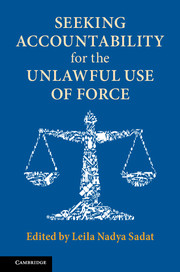Book contents
- Frontmatter
- Dedication
- Contents
- Notes on Contributors
- Foreword
- Preface
- Table of Cases
- Introduction
- PART I HISTORIC AND CONTEMPORARY PERSPECTIVES ON THE UNLAWFUL USE OF FORCE
- PART II MECHANISMS FOR RESTRAINING THE UNLAWFUL USE OF FORCE AND ENHANCING ACCOUNTABILITY
- PART III THE ILLEGAL USE OF FORCE AND THE PROSECUTION OF INTERNATIONAL CRIMES
- PART IV IMAGINING A BETTER WORLD
- Epilogue
- Index
Introduction
Published online by Cambridge University Press: 21 May 2018
- Frontmatter
- Dedication
- Contents
- Notes on Contributors
- Foreword
- Preface
- Table of Cases
- Introduction
- PART I HISTORIC AND CONTEMPORARY PERSPECTIVES ON THE UNLAWFUL USE OF FORCE
- PART II MECHANISMS FOR RESTRAINING THE UNLAWFUL USE OF FORCE AND ENHANCING ACCOUNTABILITY
- PART III THE ILLEGAL USE OF FORCE AND THE PROSECUTION OF INTERNATIONAL CRIMES
- PART IV IMAGINING A BETTER WORLD
- Epilogue
- Index
Summary
That the life of an eccentric sixteenth-century Danish astronomer should be prominently featured among the sources of inspiration for a modern-day treatise on international law may be surprising to some, but will perhaps seem less so to those familiar with his story.
Tycho Brahe was born in 1546 in Denmark, to a well-connected family of noble lineage. It may fairly be said that he was a man possessed. While at university in Rostock, Germany, he survived a duel with a fellow student in which the greater part of his nose was cut clean off. He wore a prosthetic replacement made of an amalgam of metals for the rest of his life – but it had little to do with his later claims to fame.
Although Tycho lived and died prior to the invention of the telescope, by the date of his untimely death in 1601 he had meticulously charted the position of more than a thousand stars, using only the naked eye and instruments that were built to his own specifications. The English author Alfred Noyes (perhaps best known for his poem “The Highwayman”) celebrated the astronomer's life of dogged determination in a poetic volume entitled The Torch-Bearers: Watchers of the Sky, published in 1922. I first heard of it as a young man from my father, who had read portions of it that had been poignantly quoted in the eloquent writings of the distinguished twentiethcentury jurist Justice Benjamin Cardozo. Like Cardozo, he was inspired by Brahe's story, and felt it well worth sharing.
To say that Tycho's career began, quite literally, with a bang is no exaggeration. On the night of November 11, 1572, in the skies over the Herrevad Abbey in northern Denmark, the then-twenty-five-year-old observed something quite unexpected. A light that had never been seen before was shining brightly within the constellation Cassiopeia. According to present-day reporting by the National Aeronautics and Space Administration, what Tycho saw that night was the after-effect of “a thermonuclear explosion as bright as a billion stars.”
- Type
- Chapter
- Information
- Publisher: Cambridge University PressPrint publication year: 2018



